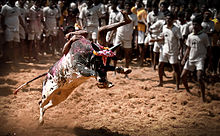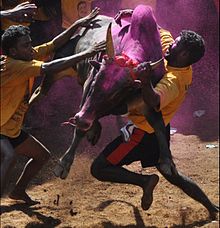- Jallikattu
-
Jallikattu (Tamil: சல்லிகட்டு) or Eruthazhuvuthal (Tamil: ஏருதழுவுதல்) or Manju Virattu is a bull taming sport played in Tamil Nadu as a part of Pongal celebrations usually on Mattu Pongal day. This is one of the oldest living ancient sports seen in the modern era. Although it sounds similar to the Spanish running of the bulls, it is quite different. In Jallikattu, the bull is not killed and the 'matadors' are not supposed to use any weapon. It is held in the villages of Tamil Nadu as a part of the village festival. The festivals are held from January to July, every year. The one held in Alanganallur, near Madurai, is one of the more popular events. There is specific breed of cattle bred for this purpose which are called by two common name, Jellicut and from the place of a big breeder Pulikulam (புலிகுளம்).[1][2]
Contents
Introduction
Jallikattu is based on the simple concept of "flight or fight or sometimes freeze". Cattle being herd and prey animals in general tend to run away from unwanted situations. But there are quite noteworthy exceptions. Cape buffalos are famous for standing up against lions and killing them. The Indian Gaur bull is known for standing its ground against predators and tigers think twice about attacking a full grown Gaur bull. Aurochs, the ancestor of domestic cattle was known for its pugnacious nature. The majority of Jallikattu bulls belong to the pulikulam breed of cattle. These cattle are reared in huge herds numbering in hundreds with a few cowherds tending to them. These cattle are for all practical comparisons, wild and only the cowherds can mingle with them without any fear of being attacked. It is from these herds that calves with good characteristics and body conformation are selected and reared to become Jallikattu bulls. These bulls attack not because they are irritated or agitated or frightened, but because that is their basic nature. Other breeds of cattle that are suitable for jallikattu are the palingu(or naatu) maadu, the umblachery and the malai maadu.
History
Jallikattu, which is bull-baiting or bull fighting, is an ancient Tamilian tradition called Eruthazhuvuthal, popular amongst warriors during the Tamil classical period.[3][4] According to legend, in olden days the game was used by women to choose their husbands. Successful "matadors" were chosen as grooms.
The term Jallikattu comes from the term Salli Kaasu (coins) and Kattu (meaning a package) tied to the horns of the bulls as the prize money. Later days during the colonial period this term got changed to Jallikattu which is the term currently used. It is said that the Tamil people hold on to their tradition forever. It is interesting to note that there is a seal from the Indus Valley Civilization depicting the sport. It is currently preserved in the Delhi museum.
Variants
There are three versions of jallikattu:
- Vadi manju virattu - this version takes place mostly in the districts of Madurai, Pudukkottai, Theni, Thanjavur, Salem. this version that has been popularised by television and movies involves the bull being released from an enclosure with an opening. as the bull comes out of the enclosure, one person clings to the hump of the bull. the bull in its attempt to shake him off will bolt (as in most cases), but some will hook the guy with their horns and throw him off. the rules specify that the person has to hold on to the running bull for a predetermined distance to win the prize. in this version, only one person is supposed to attempt catching the bull. but this rule being strictly enforced depends on the village where the event is conducted and more importantly, the bull himself. some bulls acquire a reputation and that alone is enough for them to be given an unhindered passage out of the enclosure and arena..
- Vaeli virattu - this version is more popular in the districts of Sivagangai, and Madurai. the bull is released in an open ground. this version is the most natural as the bulls are not restricted in any way (no rope or determined path). the bulls once released just run away from the field in any direction that they prefer. most don't even come close to any human. but there are a few bulls that don't run but stand their ground and attack anyone who tries to come near them. these bulls will "play" for some time (from a few minutes to a couple of hours) providing a spectacle for viewers, players and owners alike.
- Vadam manjuvirattu - "vadam" means rope in Tamil. the bull is tied to a 50-foot-long rope (15 m) and is free to move within this space. a team of 7 or 9 members must attempt to subdue the bull within 30 minutes. this version is very safe for spectators as the bull is tied and the spectators are shielded by barricades.
Training of jallikattu bulls
The calves that are chosen to become jallikattu bulls are fed a nutritious diet so that they develop into strong, sturdy beasts. the bulls are made to swim for exercise. The calves, once they reach adolescence are taken to small jallikattu events to familiarize them with the atmosphere. Specific training is given to vadam manju virattu bulls to understand the restraints of the rope. apart from this, no other training is provided to jallikattu bulls. Once the bulls are released, then instinct takes over.
Controversy
Injuries and even deaths occur in Jallikattu. In 2004, at least 5 people were reported dead and several hundreds injured in various villages. Two hundred have died over the past two decades.[5] Unlike in spanish bullfighting, the bull is not killed. There are rarely any casualties suffered by the bulls. Several animal activists object to this dangerous game every year,[6] but so far these objections have been in vain. In fact Jallikattu is loaded against the matadors, unlike in Spain bullfighting. For instance, the bull's horns are sharpened and the matador cannot use any weapons.
The Animal welfare Board of India took the case to the Supreme Court, which is considering an outright ban on Jallikattu because of the cruelty to animals and the threat to public safety involved. Bulls often have chilli pepper rubbed in their eyes, are force-fed alcohol and have their testicles pinched, all in an effort to get them crazed and frantic. Villagers throw themselves on top of the terrified animals in an effort to "tame" them and claim the prize. This is opposed by animal advocates. The AWBI comfortably forget that once the game is stopped, these bulls would end up in slaughter houses in Kerala. These groups take no measure against cow slaughter or in breeding. Also there is the risk of extinction of native cattle as the bulls brought to the function also play the role of stud bulls in their localities.
People from Tamilnadu were very displeased hearing the voice to ban jallikattu which has been a cultural and religious festival. So a committee was formed called "Tamilar Veera Vilayathu Peravai" which was headed by Dr.P.Rajasekaran from madurai , a district which is famous for its jallikattu sport. Dr.P.Rajasekaran with the support of the Tamilnadu government appealed against the claim of animal welfare board in supreme court .
On November 27, 2010 the supreme court in accordance with the law enacted on the regulation of event, permitted the Tamil Nadu government to allow ‘jallikattu’ for five months in a year from January 15 .
A Bench composed of Justice Mr. R.V. Raveendran and Justice Mr.A.K. Patnaik made it clear in their order that the animals participating in the event were to be categorized as per the provisions of the Act.
The Bench also directed the District Collectors to make sure that the animals that will be participating in Jallikattu should be registered to the Animal Welfare Board and in return the Board would send its representative to monitor over the event.
The Act states that no ‘jallikattu’ would be permitted or will be carried out without the permission of the collector and such permission should be obtained one month in prior to the event and the location should also be informed to the board before hand.
Considering the report submitted to the board, which stated the statistics of 12 deaths and 1,614 injuries at the event, the Bench directed the collectors to segregate the events into smaller and larger ones and also added that large amount should be deposited when the events were set large. The Bench considers the board’s suggestion for framing the rules.
The State also responded stating that ‘Jallikattu’ is an ancient, religious and sentimental cultural game that had been conducted for more than 400 years in rural areas during Pongal in January and also for few church festivals from January to December. However, as per the law directs, the event was restricted to five months between January and May.
The State added that at present two lakhs be deposited by the organizers for the benefit of the victims which also includes the victim’s family, in case of an accident or injury during the event.
The government said that a team of veterinarians would be present at the venue for testing and certifying the bulls for participation in the event to provide treatment for bulls that gets injured.
Artistic depictions
The event has fascinated movie makers for decades. Several movies featuring Jallikattu have been made in Tamil. The most popular among them is Murattu Kalai starring Rajinikanth playing the role of a professional and the most successful bull tamer of the village. Virumaandi, released in 2004, had Kamal Haasan playing a more effective role, and offered the most realistic depiction. He is also known to have acted without stunt doubles.
Another single painting discovered in a cave at Kalluthu Mettupatti, about 35 km west of Madurai, between Madurai and Dindigul, shows a lone man trying to control a bull. Mr. Gandhirajan estimated that this painting, done in white kaolin, was about 1,500 years old.[7]
See also
- Bull-leaping
- Running of the bulls in Spain
References
- ^ Posted by PONDHEEPANKAR (2011-01-26). "தமிழக பசுவினங்கள் / Tamilnadu regional cattle: Tamilnadu cattle Breeds". Tamilnaducattle.blogspot.com. http://tamilnaducattle.blogspot.com/2011/01/tamilnadu-cattle-breeds.html. Retrieved 2011-11-01.
- ^ "AnGR of TN for TANUVAS website" (PDF). http://www.tanuvas.tn.nic.in/nea/docs/AnGR_of_TN.pdf. Retrieved 2011-11-01.
- ^ Google books version of the book A Western Journalist on India: The Ferengi's Columns by François Gautier. http://books.google.com/books?id=o56i5ymOIBkC&pg=PA159&dq=jallikattu+history. Retrieved 2008-07-09.
- ^ Grushkin, Daniel (2007-03-22). "NY Times: The ritual dates back as far as 2,000 years...". The New York Times. http://travel.nytimes.com/2007/03/22/travel/21webletter.html. Retrieved 2008-07-09.
- ^ NDTV
- ^ The New York Times. http://www.nytimes.com/reuters/news/news-india-peta-bulls.html?scp=5&sq=india.
- ^ "The Hindu : Bull chasing, an ancient Tamil tradition". The Hindu. http://www.hinduonnet.com/2008/01/17/stories/2008011759090900.htm. Retrieved 2008-06-14.
External links
Categories:- Tamil sports and games
- January observances
- Bullfighting
- Traditional sports of India
- Sport in Tamil Nadu
Wikimedia Foundation. 2010.


